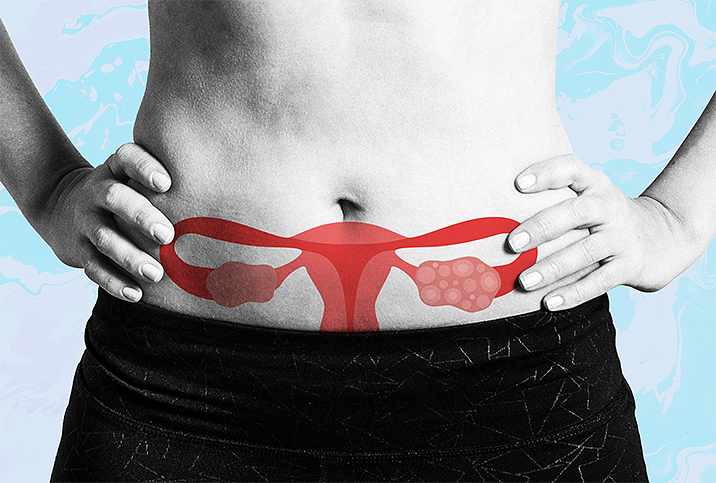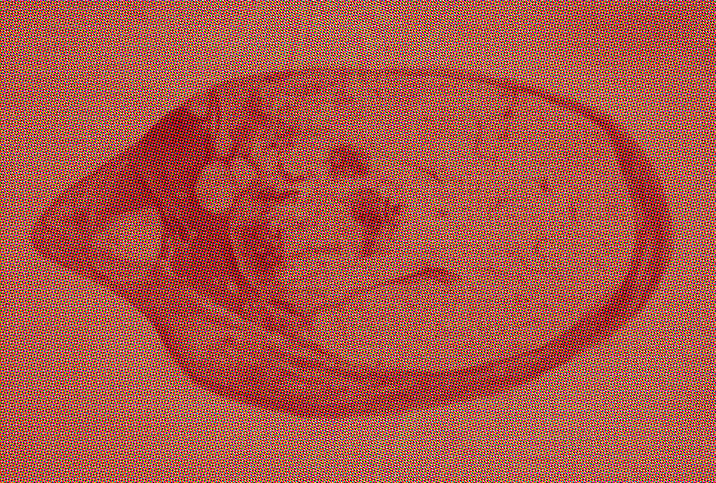Managing Sex With Ovarian Cysts

Women are challenged by a variety of potential gynecological issues that can wreak havoc on their sex lives. Ovarian cysts, while they regularly fly under the radar in patients who do not experience any symptoms, are among those issues.
These pesky sacs are small but mighty, and the shadow they cast over sex, while significant, is not insurmountable.
Reigniting your sex life while living with ovarian cysts requires patience, a generous helping of self-awareness and, perhaps most importantly, an empathetic doctor.
What are ovarian cysts?
"An ovarian cyst is a sac filled with fluid or semisolid material that develops inside or outside—on the surface—of the ovary," explained Amir Marashi, M.D., a board-certified OB-GYN with Brooklyn Gynecology Place in New York City and founder of Cerē, which develops physician-designed pleasure products for women.
Although estimates vary, about 20 percent of women develop at least one pelvic mass in their lifetime. Eight percent of premenopausal women develop large cysts that require treatment, but typically, ovarian cysts are asymptomatic and noncancerous. They rarely cause problems and do not require treatment.
"Ovulation is the main cause of ovarian cysts," Marashi said. "Other cysts can be caused by endometriosis or pelvic inflammatory disease [PID]."
There are different types of ovarian cysts. Functional cysts, which are caused by ovulation, are the most common and come in two types: follicular cysts and corpus luteum cysts.
"Follicular cysts form when a follicle in the ovary doesn't release an egg as it should but instead fills with fluid and gets bigger," Marashi explained. "Corpus luteum cysts form when fluid collects in the corpus luteum, a hormone-producing group of cells made after the follicle releases an egg."
Albeit rare, ovarian cysts may make penetrative sex painful or uncomfortable, causing sexual intercourse to be difficult. The associated bloating and feeling of fullness also act as a barrier to sex.
Other kinds of cysts do not have any relation to the menstrual cycle. These include:
- Dermoid cysts/teratomas, which are made up of all types of tissue in the human body
- Endometriomas
- Ovarian cancer growths
- Cystadenomas, which are fluid-filled cysts that range in consistency from watery to mucous-like
While most ovarian cysts do not cause any symptoms, larger ones may cause pelvic or lower back pain, a feeling of fullness or bloating, and painful periods. An extremely large cyst can cause ovarian torsion, which is when the ovary twists. This constitutes a medical emergency and requires intervention.
"Ovarian cysts can be diagnosed with a pelvic exam, medical imaging studies—ultrasound is the most common—or laparoscopy," Marashi said. "If medically necessary, cysts can be removed with laparoscopy."
How do cysts interfere with sexual function?
"It is normal to struggle to engage in sex if ovarian cysts are causing discomfort," Marashi explained. "If it is greatly impacting a patient's quality of life, I recommend having the cyst removed."
Albeit rare, ovarian cysts may make penetrative sex painful or uncomfortable, causing sexual intercourse to be difficult. The associated bloating and feeling of fullness also act as a barrier to sex because the pelvic area and stomach may be uncomfortable, especially in sex positions where weight is placed on the trunk area.
Though it's unusual, intense physical activity, including vaginal sex, increases the risk of an ovarian cyst rupture, which causes significant pain and bleeding in the pelvis.
Dealing with a symptomatic ovarian cyst also has an emotional fallout. Experiencing any type of pain, let alone severe pelvic pain, is distressing and can make the idea of sexual activity too overwhelming to consider.
If the pain caused by ovarian cysts interferes with your pleasurable ventures for too long, it's time to consult a doctor.
Potential options for managing sex and ovarian cysts
Dealing with the symptoms of an ovarian cyst is a laborious process, especially if surgery is required, but some at-home remedies are available to alleviate the pain.
Over-the-counter pain relievers are an obvious choice to help manage the pain and discomfort caused by ovarian cysts. Some people find symptom relief from specific teas. Various studies point to ginger as having positive clinical effects. A 2020 review of the overall effects of ginger on the human body, published in Nutrients, suggests ginger—ingested in tea or some other way—has anti-inflammatory properties and alleviates symptoms of nausea and vomiting.
A 2016 study published in Phytomedicine suggests that long-term use of chamomile tea significantly reduces moderate to severe symptoms of generalized anxiety disorder, which can exacerbate pain and sexual dysfunction.
Heat therapy is also beneficial for managing pain. A hot water bottle or a heated pad may ease pain and bloating. Epsom salt baths may help with muscle soreness.
These options might make sex with an ovarian cyst more accessible, but avoid engaging in sex if the symptoms are too much to handle.
Consider visiting a therapist to evaluate and treat the psychological impact of the discomfort, especially if you have elected not to pursue surgery or the wait time is stretching out before you. Suffering in silence can compound the pain and emotional toll.
If you don't have a therapist you see regularly but want to talk to someone, telehealth could be a good way to connect. Video visits are a viable option for most people, and more physicians and therapists have added them as a service. Many of them offer same-day appointments at affordable rates. Giddy telehealth makes it easy to get connected to a qualified healthcare professional who can help with a variety of conditions, emotional and physical.
Self-discovery and communication are key
Before diving into sex, figure out how the symptoms are affecting your sexuality. Is it purely mental stress or are there physical barriers making it difficult to engage?
For primarily psychological issues, experiment solo first and use masturbation as a gentle gateway to partnered sex.
"For people who do not feel comfortable having sexual activity with a partner, they can try to achieve self-pleasure through masturbation," Marashi said. "My recommendation is to get creative, whether it's with trying manual stimulation with your hand or using different vibrators or lubricants. If you're using a vibrator, keep in mind there's no right or wrong way to position the vibrator; just experiment until you identify what feels most pleasurable for you."
To manage physical symptoms, experiment with your favorite sex positions while masturbating. Perhaps missionary is off the table due to bloating or pain, but doggy style or cowgirl may be more comfortable. Alternatively, during penetrative vaginal sex, avoid positions that go too deep or get too vigorous, as this may trigger additional pain and discomfort.
Try to deprioritize penetrative sex. It is not the king of all sexual activity. And for people with ovarian cysts, it can be too painful to fully enjoy. Focus on other erotic and intimate activities, such as roleplay, oral sex, playing with toys and erotic massage, until you feel healthy enough to reintroduce penetrative sex.
"Open communication with a partner is always important," Marashi added. "It might be helpful to explain that many people have ovarian cysts and that they are common."
No matter how long it takes to heal, do not prioritize satisfying a partner over your own health needs. Their pleasure—or even yours—is not as important as protecting your health.
Set strong boundaries and say no when it feels necessary. It is always OK to not want to have sex.


















